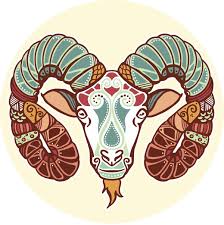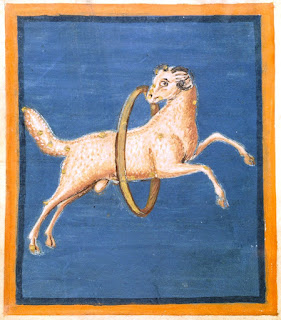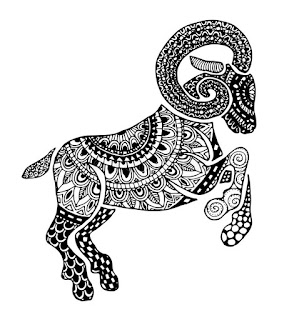Age of Aries
When the Earth suddenly became immense light, and it was a diverse impetus that took the towns, the great cities, the own nature. After two thousand years of a slow and tranquil influence of the Sign of Taurus, the most fixed energy of the entire firmament, entered our cosmos in the rhythm of Aries, the impulsive flame that everything flourishes on the extreme flow.
 Time for many changes, as the transits of Ages tend to be, and the first news that we have conclusively on the Age of Aries seems to be - at least in the World before-India - of the "people of the sea." It is to be regretted that the first news are of sad report. It contributes to some ill-fated stereotypes of the nice sheep. However, the first flashes of the cardinal flame certainly manifested themselves strongly in culture, at festivals, in the very representation of their Gods, and more-than-all in feeling this World: suddenly there wasn't more face the Earth of planet Earth: parked ground on which we plant, and that slowly bu surely we reap... It was the Earth now an infinite calling forth, suddenly suddenly... And now it was so much more immense that call of the sea. If we examine the culture of the Age of Aries, we can see what certainly in it's earliest beginnings already started, but which of the later Greek-Roman world we know best.
Time for many changes, as the transits of Ages tend to be, and the first news that we have conclusively on the Age of Aries seems to be - at least in the World before-India - of the "people of the sea." It is to be regretted that the first news are of sad report. It contributes to some ill-fated stereotypes of the nice sheep. However, the first flashes of the cardinal flame certainly manifested themselves strongly in culture, at festivals, in the very representation of their Gods, and more-than-all in feeling this World: suddenly there wasn't more face the Earth of planet Earth: parked ground on which we plant, and that slowly bu surely we reap... It was the Earth now an infinite calling forth, suddenly suddenly... And now it was so much more immense that call of the sea. If we examine the culture of the Age of Aries, we can see what certainly in it's earliest beginnings already started, but which of the later Greek-Roman world we know best. The sea peoples caused extensive disturbances in Magna Greece and the Italic Peninsula, and it is widely suspected that those of the cape with feathers and circular shields, defeated in Egypt and figured in several inter-pyramid murals, would already be the Homeric, valiant ancestors of Helena, to give the faces.
The sea peoples caused extensive disturbances in Magna Greece and the Italic Peninsula, and it is widely suspected that those of the cape with feathers and circular shields, defeated in Egypt and figured in several inter-pyramid murals, would already be the Homeric, valiant ancestors of Helena, to give the faces. However, at least until Alexander, continued Greece a region of lesser refinement, and it was upon disembarking on the east-Mediterranean coast, Phoenicia, Assyria, that they transformed history; Much of the Assyrian empire fell, as did many ancient Anatolian kingdoms; Remained Egypt as the last bastion of the splendorous empires of the Age of Taurus, always sustained on this tripod: Egypt, Tigres-Euphrates, Anatolia.
However, at least until Alexander, continued Greece a region of lesser refinement, and it was upon disembarking on the east-Mediterranean coast, Phoenicia, Assyria, that they transformed history; Much of the Assyrian empire fell, as did many ancient Anatolian kingdoms; Remained Egypt as the last bastion of the splendorous empires of the Age of Taurus, always sustained on this tripod: Egypt, Tigres-Euphrates, Anatolia.
A few letters that were left to us show a frightful astonishment of the kings of the outstanding Mediterranean cities, asking Egypt for help against this new, unthinkable adversary. The ships came, about six or seven different peoples, but allied with each other in their strikes, ready to everything dominate. They threw themselves forward as if were the walls of ancient empires no tougher than the waves of the sea.
The Age of Taurus prevailed to safety, tranquil living, the quiet appreciation of the ground, the clay or any firm pyramidal mountain. It is to be understood that, through cautious fate, the balance between the three kingdoms - Assyria, Pharaohs and Hittites - always knew how to be maintained. The people of the sea who first deranged millennial ordination; A thousand years later, it will be up to Kuruk, the young Cyrus, to gallop down the Parthian steppes to finally demolish Egypt for no more; Finally the world being under one scepter; And this, which of Aries is, to lead, the more it will fit well in the be-ending of the Arian Age, when Rome, Sassanides and China cut much wider world in a balanced triad.
 Now, in thinking of Cyrus, already ahead years of these astral times - a long-bearded sheep, if we compare with the age of the nautical ventures of the people of the sea - we see, in short, how so little we know of this longing Aries Age. There are statues and Greek myths and letters in profusion; Which so enchanted and enchant in the extreme intensity, Bacchic, of Mars. But all of a short period; Herodotus already declares Cyrus in the remote past, and from Plato to Alexander is a fall of beard.
Now, in thinking of Cyrus, already ahead years of these astral times - a long-bearded sheep, if we compare with the age of the nautical ventures of the people of the sea - we see, in short, how so little we know of this longing Aries Age. There are statues and Greek myths and letters in profusion; Which so enchanted and enchant in the extreme intensity, Bacchic, of Mars. But all of a short period; Herodotus already declares Cyrus in the remote past, and from Plato to Alexander is a fall of beard.
What so much happened in the centuries before Cyrus is what we are trying to unveil today by reading those thousythousands of clay little stones, cuneiform, a writing that, so sure, could only be the product of Taurian minds. Of the oldest, we see Sumerian and Elamite, that, millennia before the Chinese went ahead of Gutenberg, invented the press - but extremely secure, in stone clay made to last whatever eternity came.
From this we have a paradoxical reality; Having the Arian Age continued with this writing, today we find an immense quantity of texts of this time, perhaps even more copious than the Greek literature; But randomly arranged, largely consisting of administrative documents ... Unlike the Greek, carefully selected and copied for centuries as far as religious authoritarianism didn't forbid.

Accompanying these rocks we see various languages, and the slow emergence of the Semitic alphabets - of three consonants; The lingua franca was the Akkadian, of the Imperial City of Akkad, a jewel of the times almost unknown, in which, as in Egypt, the ancient traditions were maintained, and Sumerian was studied as until recently we used to study Latin. The Ugaritic appears as the first language at the same time cuneiform and alphabetical; The Hurrian is much studied, in which were found dozens of musical compositions yet to definitively deciphering; The Hittites - reigning in Anatolia - adapted the Akkad writting to their language, bequeathing to us the oldest ancestor of English, a few centuries before Sanskrit

The vivid Bronze Age, from the days of Troy and Penelope; It is no exaggeration to consider that most of the human culture present today in the World originates in the Age of Aries.
Already in its end, in Alexandria, was made ample compilation of the new millenarian knowledge. Similar process occurred in India and China. It is true that this whole culture had a more archaic origin; But we know little of this, and it seems to us that the Age of Pisces and Aquarius made few renewals in what Aries bequeathed to us: the bases were already given. The untiring Arian impetus took advance in all fields of human living: all arts, sciences, experiences - so that at the end of this Age everything would be in the language of Sappho properly registered.
Astrology, Philosophy, Botany and Zoology, Medicine, Geometry, Architecture, Physics and Metaphysics ... Everything, everything was compiled in Alexandria, with the same eagerness that classical Athens had for knowledge, but now with access to wide papyrus sources which Plato had only dreamed of.

And this is why our old traditional Astrology in Aquarian times seems so naive: beneficent and evil planets are distinguished and the questioner is soon told his certain destiny - a direct and fateful clairvoyance that led Horace to sign - Tu ne quaesieris, scire nefas - You do not question, to know is nefarious... A thousand years later, Omar Khayam would also criticize astrology, but with less scare, and more for painting a world of constant delusion:

In the Heavens there is a bull bellowing
Under the Earth a buried bull
And among these two bulls, oh astrologer,
Wander a bunch of donkeys.
In the early Netunian calends, the immediacy of Astrology to the mystic Plotinus caused allergy. "How do the stars look at each other and turn back and invoke each other ?!" Without, however, by its evident effects - and in this his time impress us with aquatic rationalism - to question its validity.
If all the sciences of this epoch seem to us endowed with frank ingenuity, the arts, however, are usually more admired for their intensity, vigor, and immediate purity.
The XVIII century, already in the afterscare of the thousand and one nights, was astonished at the concrete language, always dealing with the most real living, despise-abstractions, of Homer. The few known stanzas of Pindar never failed to cause frisson, and there are those who guarantee that the most beautiful poem of Love which is known is the only one we know of Sappho.
 Their statuary has been as a model for millennia, but this not only for the perfection of the trait, but for the very force with which the Gods were represented. They needed no aureoles of mysticism, the Gods were there, to be touched - no other reason would there be for such detailed abdomen, muscles, the twitching of the arms ... And Aries does not rule even the Ascendant, vital and corporeal force? The look-beyond gave them what divine, but they were irremediably there, so that their whole body strength was felt by us. All the refined mystical twists with which the Piscian art knew how to arabesque itself are no doubt marvelous, but this immediacy of ancient art never ceased to cause wondrous amazement.
Their statuary has been as a model for millennia, but this not only for the perfection of the trait, but for the very force with which the Gods were represented. They needed no aureoles of mysticism, the Gods were there, to be touched - no other reason would there be for such detailed abdomen, muscles, the twitching of the arms ... And Aries does not rule even the Ascendant, vital and corporeal force? The look-beyond gave them what divine, but they were irremediably there, so that their whole body strength was felt by us. All the refined mystical twists with which the Piscian art knew how to arabesque itself are no doubt marvelous, but this immediacy of ancient art never ceased to cause wondrous amazement.Not for nothing a good part of the Age of Pisces was repeated between multiple moments of "reborning" this past. It is true that religious authoritarianism and its forcible cultural repression have greatly contributed; But that aesthetics so unique and different, that referred to a whole different way of seeing and living life, of understanding the World: it was what efforted to from within itself make reborn. After all, if it was the same ground there of Italy, and there was everything around, although in ruins, how would that land and that same sea, in the instant now, this reality deny to me? The question, perhaps, was in the heavens. Already in enlightened times, Winckelmann little will disguise us that he speaks not so much of statues than of the stunning Greek living. Since the times of the people of the sea.
And suddenly a mystic veil covers us; At first, it is all a babble of doctrines, trembling between the teeth for such an immediate newness: hermetisms, cabals, gnosticisms, zoroastrisms, manichaeisms...
The vivacious of the world yields to its great mystery: and all that is ours is to delineate, is to entangle ourselves in these veils; Renewed times, renewed heavens.






Comments
Post a Comment